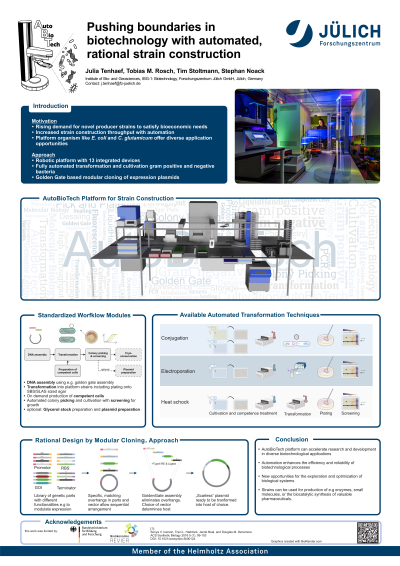Frontiers in Technology
Poster Session A
(1022-A) AutoBioTech – Pushing boundaries in biotechnology with automated, rational strain construction
Tuesday, May 28, 2024
16:30 - 17:15 CEST
Location: Exhibit Hall


Julia Tenhaef, PhD (she/her/hers)
Postdoctoral Associate
Forschungszentrum Juelich
Juelich, Nordrhein-Westfalen, Germany
Poster Presenter(s)
Abstract: Automation in biotechnology offers a multitude of advantages that revolutionize experimental design, execution, and data analysis. By minimizing manual intervention, automation reduces human error and enhances the reproducibility of experiments. The precise control afforded by automated systems ensures consistency across experiments, leading to more reliable results. Moreover, the accelerated pace of experimentation facilitated by automation enables researchers to explore a broader range of conditions and variables, thus driving the establishment of a bioeconomy forward.
Our AutoBioTech robotic platform is specifically tailored for the construction and transformation of bacterial production hosts, addressing the need for versatility in biotechnological applications. Escherichia coli and Corynebacterium glutamicum are two widely utilized microbial hosts with distinct advantages for various bioproduction processes. Our AutoBioTech team at Forschungszentrum Jülich uses lab automation in combination with standardized molecular cloning workflows to accelerate the rational microbial strain development. Robotic systems such as liquid handlers and multi-axis robotic manipulators are used to automate the entire strain construction process – from plasmid design and assembly to transformation and propagation steps, isolation of enriched plasmids, and microbial phenotyping. The platform provides a framework for genetic engineering and metabolic pathway optimization as well as enzyme engineering.
Central to our platform is the implementation of high-throughput assembly and multiple transformation techniques for different bacterial hosts, such as chemical transformation, electroporation and conjugation. The traditional methods of these genetic manipulation are often labor-intensive and time-consuming. However, by means of automation, we significantly accelerate the construction of genetic circuits, pathways, and expression vectors. This approach allows for the rapid exploration of genetic design space, enabling researchers to assess different variants in a systematic and efficient manner.
In conclusion, the translation of manual biotechnological workflows into automated workflows, coupled with a platform designed for multiple production hosts enables a significant leap forward in the field of synthetic biology. These advancements not only enhance the efficiency and reliability of biotechnological processes but also open new opportunities for the exploration and optimization of biological systems. The presented platform holds promise for accelerating research and development in diverse biotechnological applications, ranging from the production of enzymes, small molecules, or the biocatalytic synthesis of valuable pharmaceuticals.
Our AutoBioTech robotic platform is specifically tailored for the construction and transformation of bacterial production hosts, addressing the need for versatility in biotechnological applications. Escherichia coli and Corynebacterium glutamicum are two widely utilized microbial hosts with distinct advantages for various bioproduction processes. Our AutoBioTech team at Forschungszentrum Jülich uses lab automation in combination with standardized molecular cloning workflows to accelerate the rational microbial strain development. Robotic systems such as liquid handlers and multi-axis robotic manipulators are used to automate the entire strain construction process – from plasmid design and assembly to transformation and propagation steps, isolation of enriched plasmids, and microbial phenotyping. The platform provides a framework for genetic engineering and metabolic pathway optimization as well as enzyme engineering.
Central to our platform is the implementation of high-throughput assembly and multiple transformation techniques for different bacterial hosts, such as chemical transformation, electroporation and conjugation. The traditional methods of these genetic manipulation are often labor-intensive and time-consuming. However, by means of automation, we significantly accelerate the construction of genetic circuits, pathways, and expression vectors. This approach allows for the rapid exploration of genetic design space, enabling researchers to assess different variants in a systematic and efficient manner.
In conclusion, the translation of manual biotechnological workflows into automated workflows, coupled with a platform designed for multiple production hosts enables a significant leap forward in the field of synthetic biology. These advancements not only enhance the efficiency and reliability of biotechnological processes but also open new opportunities for the exploration and optimization of biological systems. The presented platform holds promise for accelerating research and development in diverse biotechnological applications, ranging from the production of enzymes, small molecules, or the biocatalytic synthesis of valuable pharmaceuticals.
